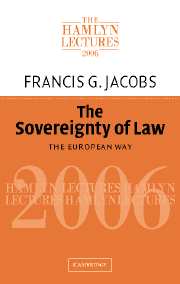Book contents
- Frontmatter
- Contents
- The Hamlyn Trust
- The Hamlyn Lectures
- Preface
- 1 Introduction
- 2 The rule of law in Europe
- 3 The European Convention on Human Rights and the rule of law
- 4 The European Union and the rule of law
- 5 Fundamental values
- 6 Courts and free markets
- 7 The European Union today: some achievements
- 8 The European Union today: some problems
- Afterword
- Index
5 - Fundamental values
Published online by Cambridge University Press: 29 July 2009
- Frontmatter
- Contents
- The Hamlyn Trust
- The Hamlyn Lectures
- Preface
- 1 Introduction
- 2 The rule of law in Europe
- 3 The European Convention on Human Rights and the rule of law
- 4 The European Union and the rule of law
- 5 Fundamental values
- 6 Courts and free markets
- 7 The European Union today: some achievements
- 8 The European Union today: some problems
- Afterword
- Index
Summary
In this chapter, I continue with the theme of law and values. Here, we are concerned with fundamental ethical values. How does the law, and how do the courts, respond? How are the courts influenced by prevailing social values? How do they react as values change? How far do their decisions, in turn, influence values? What are the proper limits on the role of the courts?
We must inevitably be selective, trying to select those areas which best illustrate the theme. Some of the questions are old, but they can be seen in a new context. And in particular, in a European context.
Religious freedom
I would illustrate the theme with examples from three areas. The first is religious freedom. This is a relatively recent freedom, which emerged after many centuries of religious persecution in Europe. But what is the proper scope, what are the proper limits, of religious freedom? The issues are extremely topical.
And the subject is appropriate for several reasons. First, it illustrates the problem of conflicting values – for example, in the relationship with freedom of expression. In some respects, religious freedom requires freedom of expression, and perhaps reinforces the need for it. In other respects, there may be a conflict between religious freedom and freedom of expression: or at least, respect for religion may be held to impose some limits on freedom of expression.
- Type
- Chapter
- Information
- The Sovereignty of LawThe European Way, pp. 67 - 96Publisher: Cambridge University PressPrint publication year: 2007

